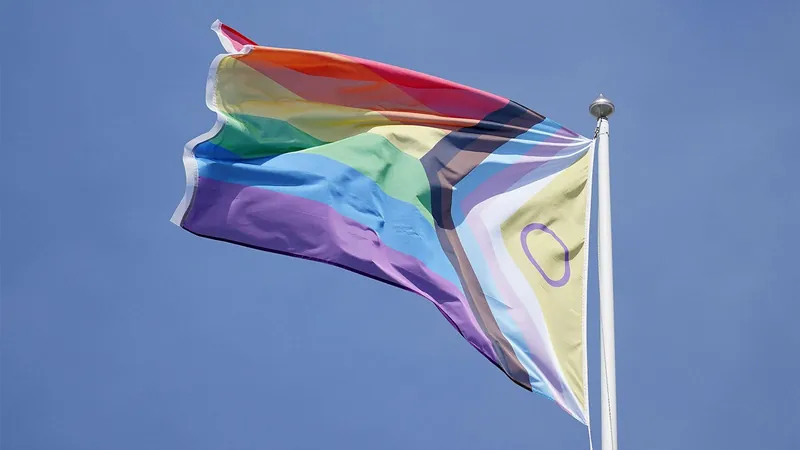
Shocking Study Reveals Conversion Practices Linked to Increased PTSD and Suicidal Thoughts
2024-09-30
Introduction
A groundbreaking cross-sectional study has uncovered alarming connections between conversion practices and heightened mental health issues among sexual and gender minority individuals. The analysis, involving over 4,000 participants, indicates that those who reported exposure to both gender identity and sexual orientation conversion practices experienced significantly greater symptoms of post-traumatic stress disorder (PTSD) and suicidality.
Research Details
Dr. Mitchell R. Lunn and his team from Stanford University School of Medicine conducted the research, which revealed that individuals exposed to conversion practices were more likely to exhibit severe mental health symptoms. Specifically, self-reported exposure to conversion practices for gender identity was most notably linked to increased depressive symptoms. The study shows a concerning coefficient of β 3.24, suggesting a strong correlation with heightened depression levels compared to those who had no exposure.
Comments from Researchers
Nguyen K. Tran, another co-author from Stanford, emphasized the adverse mental health outcomes faced by LGBTQIA+ individuals subjected to these practices. "Our findings highlight a critical need for protective policies, affirming mental health care, and supportive resources for those affected," Tran stated. This sentiment underscores the urgent call for comprehensive support systems for individuals grappling with the fallout from such harmful practices.
Role of Mental Health Professionals
The study also shed light on the alarming role of mental health professionals in facilitating conversion practices, with nearly 29% of sexual orientation conversion practices and over 54% of gender identity conversion practices being led by these practitioners. Tran pointed out, "Despite widespread opposition from established healthcare organizations like the American Psychiatric Association, harmful practices persist within both religious and mental health contexts."
Need for Effective Support
A crucial aspect of this conversation revolves around developing effective support for LGBTQIA+ individuals impacted by conversion practices. Tran suggests that connecting these individuals with affirming LGBTQIA+ networks, ensuring access to respectful mental health care, and fostering self-esteem can be vital steps toward healing.
Historical Context
Historically, the psychiatric field has made troubling attempts to change sexual orientation. Jack Drescher, MD, from Columbia University Medical Center commented on the study's importance, referencing the APA's past decisions regarding psychiatric diagnoses that were once used to justify such practices. He argues for modern mental health organizations to better regulate the activities of clinicians who still engage in conversion practices, advocating for ethical guidelines that reflect evolving cultural beliefs and acceptance of diverse sexual orientations and gender identities.
Methodology and Findings
The data for this significant study was obtained from The Pride Study, an online cohort study focusing on sexual and gender minority adults. Participants answered two crucial yes/no questions regarding their experiences with therapy or programs aimed at altering their gender or sexual orientation. The study reported that a shocking 5.4% of sexual and gender minority participants experienced exposure to conversion practices.
Limitations and Recommendations
However, significant challenges remain, as the study acknowledges limitations related to a non-representative online sample and the reliance on self-reported measures susceptible to recall bias. Despite these limitations, the findings paint a troubling picture and call for immediate action in the mental health domain to protect and support LGBTQIA+ individuals.
Conclusion
As the conversation about mental health and LGBTQIA+ rights continues to evolve, it is clear that further research, protective legislation, and expansive support systems are essential to combat the devastating impact of conversion practices. If you or someone you know is struggling with similar issues, don't hesitate to reach out to your local mental health resources—you're not alone, and help is available.


 Brasil (PT)
Brasil (PT)
 Canada (EN)
Canada (EN)
 Chile (ES)
Chile (ES)
 España (ES)
España (ES)
 France (FR)
France (FR)
 Hong Kong (EN)
Hong Kong (EN)
 Italia (IT)
Italia (IT)
 日本 (JA)
日本 (JA)
 Magyarország (HU)
Magyarország (HU)
 Norge (NO)
Norge (NO)
 Polska (PL)
Polska (PL)
 Schweiz (DE)
Schweiz (DE)
 Singapore (EN)
Singapore (EN)
 Sverige (SV)
Sverige (SV)
 Suomi (FI)
Suomi (FI)
 Türkiye (TR)
Türkiye (TR)